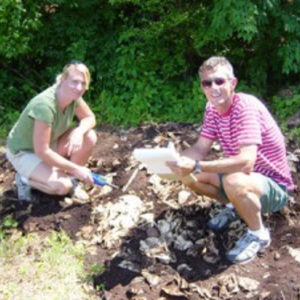
Michael McKinney with an undergraduate student conducting research at the UT compost facility which reduces the university’s greenhouse gas footprint, saves landfill space and saves thousands of dollars.
by Jason Moody
Michael McKinney, professor in the Department of Earth and Planetary Sciences, is joining the Center for Global Engagement’s Global Research Office as the Global Sustainable Development Faculty Fellow for 2023.
The position was created to bring awareness and education to campus about the United Nations Sustainable Development Goals. The SDGs are a set of 17 goals, established in 2015, to “end poverty, protect the planet and ensure that by 2030 all people enjoy peace and prosperity.”
Here at The University of Tennessee, Knoxville, the position aims to develop and track academic initiatives and explore ways for supporting UT faculty to integrate the global elements of the SDGs into more courses across the university. This will also involve efforts to promote strong interdisciplinary relationships among departments, schools and colleges across the UT campus.
McKinney has been with UT for 37 years and has served in many capacities. About 20 years ago, he established the Environmental Studies program and still serves as the director. A decade ago, he established the sustainability major, now housed in the Department of Geography and Sustainability. He serves on the Committee on the Campus Environment and is a member of the sustainability working group.
Currently, his professional and teaching time is spent on urban ecology, the study of ecosystems that include humans living in cities and urbanizing landscapes. He seeks to answer big sustainability questions. How do we build structures that reduce our carbon footprint? How do we teach people to live sustainably with native wildlife? How do we grow food sustainably? While doing all that, how do we address environmental justice issues and make people happy?
On how he got connected to this role and why he was interested McKinney says, “I do a lot with sustainable cities and that’s really what has gotten me interested in this SDG gig. If we’re going to solve these overwhelming global environmental challenges, we need to teach people how to live sustainably. That’s why I’m really interested in the Center for Global Engagement because a lot of it involves educating people about globalization and thinking globally.”
One of the ways in which McKinney’s work addresses these challenges is his green roof lab near the UT Gardens on the Institute of Agriculture campus. Green roofs mean exactly what you may be thinking—plants on roofs. Green roofs address sustainability by reducing energy consumption and reliance on air conditioning and heating. In addition to other benefits, they also extend roof lifespans, reduce flooding and provide habitat for biodiversity to flourish.
McKinney also works on other green infrastructure projects including a funded experimental project to use vegetation instead of rocks for reducing erosion along the Tennessee River. If successful, this will be a less costly and environmentally friendly way of stabilizing erosion along the river.
Before McKinney began this role, the Global Research Office began the work to engage the UT campus around the SDGs. UT’s standing in the “Times Higher Education” impact rankings rose from the top 200–300 universities in the world in 2021 to the top 100–200 universities in 2022. The university also badges its courses to show students which classes align with specific SDG goals.
McKinney wants to take this foundation built by the Global Research Office and “increase UT’s visibility with the international community for SDGs.” He hopes to share the impact UT is having as he collaborates with his colleagues on sustainable cities in places like Germany and Scandinavia where urban sustainability has received much greater attention.
McKinney wants to explore ways to make sustainability concepts more accessible to students in any major or college in the university. He wants to use this role to share his philosophy “that sustainability doesn’t belong in any one department.”
While a sustainability certificate program is coming soon to UT, McKinney wants to take that a step further and perhaps create a university-wide introductory course or concentration in sustainability. These would complement or expand existing curricula so that faculty interested in sustainability could coordinate more effectively instead of working in isolation.
Additionally, McKinney believes that “sustainability has to be pragmatic to be successful.” Demonstrating this approach, McKinney spends time supporting a student organization called Smokey’s Cleanup Crew. The organization helps to keep a litter free UT campus. After they complete community service, they provide a report showing dollars saved to the university due to their volunteer hours.
He also wants to incorporate more sustainability into the business curricula at UT with the continued development of a relationship with the Haslam College of Business. He sees the college as a key component of engaging the university in the SDGs.
We are already seeing this with the inclusion of greenhouse gas accounting in some accounting courses. Business professors are introducing the sustainability concept into their curriculum and preparing students so that “when they go to work for a big five company, they [already] know how to talk the language of the SDGs.”
McKinney acknowledges that the global impact of our local sustainability choices can be difficult for students to grasp if they don’t have the luxury to travel and learn abroad. In that spirit, he hopes to build a sustainability approach right here at UT that gives all students access to sustainability experiences on campus that engage the global aspects of the SDGs.
For more information about the SDGs and SDG badged courses available at UT, visit https://cge.utk.edu/sdg17/.
CONTACT:
Jason Moody (865-974-5752, jmoody9@utk.edu)